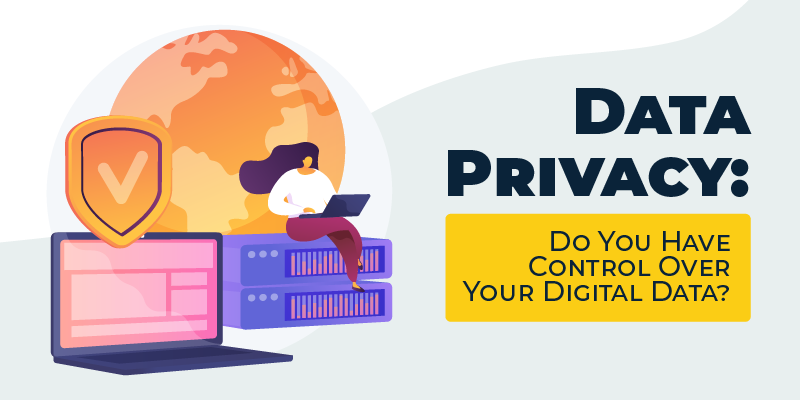As consumers continue to absorb digital technology into their daily lives, they generate large amounts of online data that can be traced back to them, making them susceptible to identity theft and other security threats. These data, including personally identifiable information and location-tracking, are highly valuable for businesses because they can use these insights for their own benefit in multiple ways.
One application of data mining used by companies worldwide is personalized marketing. Many enterprises collect and analyze the digital data consumers leave to get a clearer picture of their pain points and unmet needs. Doing so allows businesses to devise better-targeted advertisements and hyper-personalized marketing strategies.
Knowing that companies can easily get hold of their data, consumers worldwide are becoming increasingly fearful of how much and what kind of information they’re leaving online – and for good reason.
Global Consumer Concern Over Data Privacy
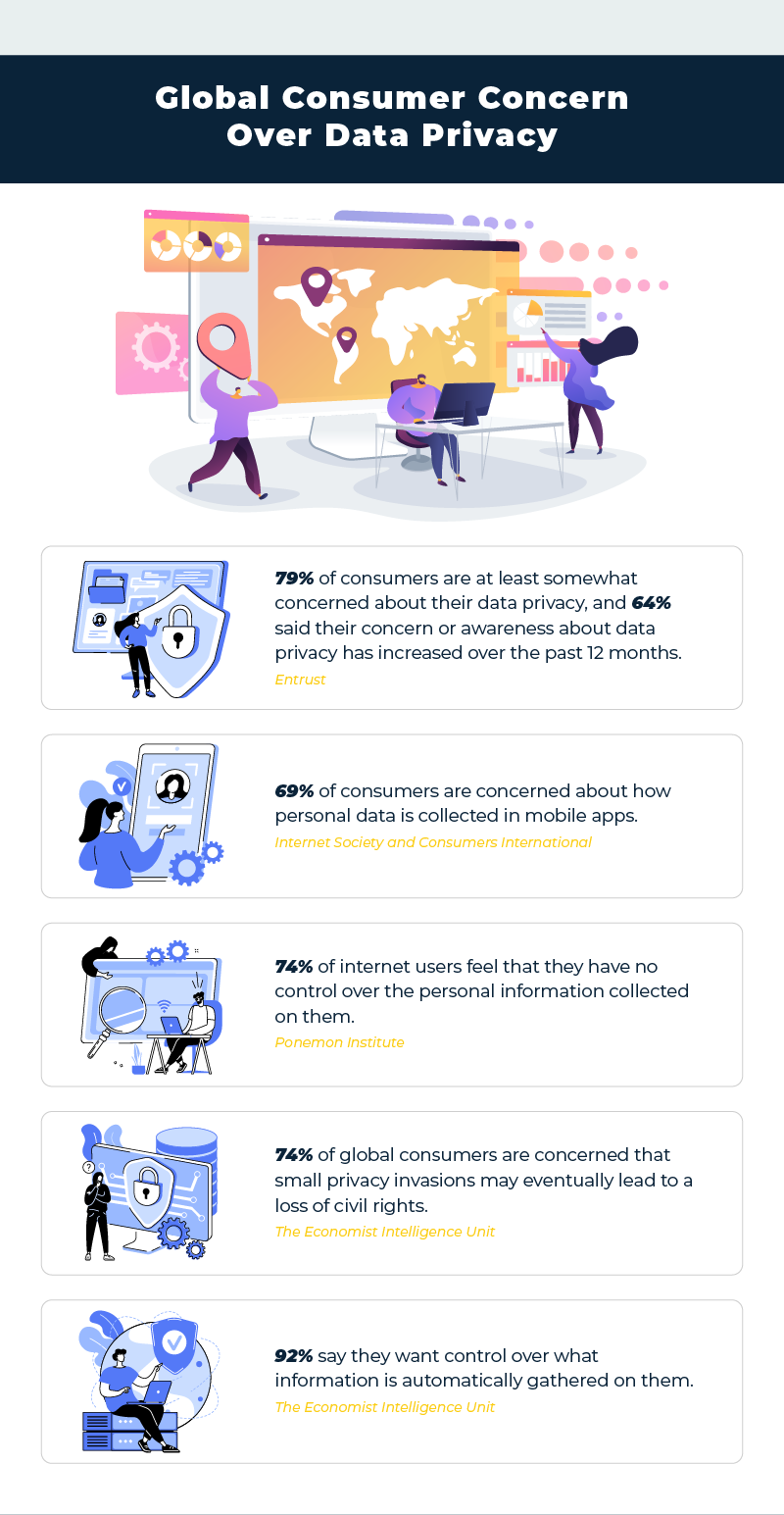
We’ve seen massive data breaches affecting millions of users across the globe these past few years, with well-known enterprises at the forefront of these scandals. Thanks to these data security crises, people started to grasp exactly how much personal information websites obtain from them.
For instance, Facebook suffered yet another data privacy scandal just last year. The breach leaked the full names, phone numbers, locations, and email addresses of 533 million users in 106 countries.
With the growing prevalence of data security breaches comes consumers’ increasing concern for online privacy. More and more users are becoming anxious over the amount and type of data they leave online, according to a 2021 study by Entrust. The findings reveal that 64% of consumers claim that their concern about data privacy has increased within the last 12 months.
Additionally, 69% said they’re especially worried about how businesses collect consumer information through mobile applications.
This collective fear stems primarily from the feeling that they have no control over the kind and amount of information collected on them. Research from the Ponemon Institute shows that 74% of consumers share this worry.
To protect themselves from identity theft, 92% of online users wants to exert more control over the data that websites automatically gather from them.
Comfort Level Over Sharing Personal Information
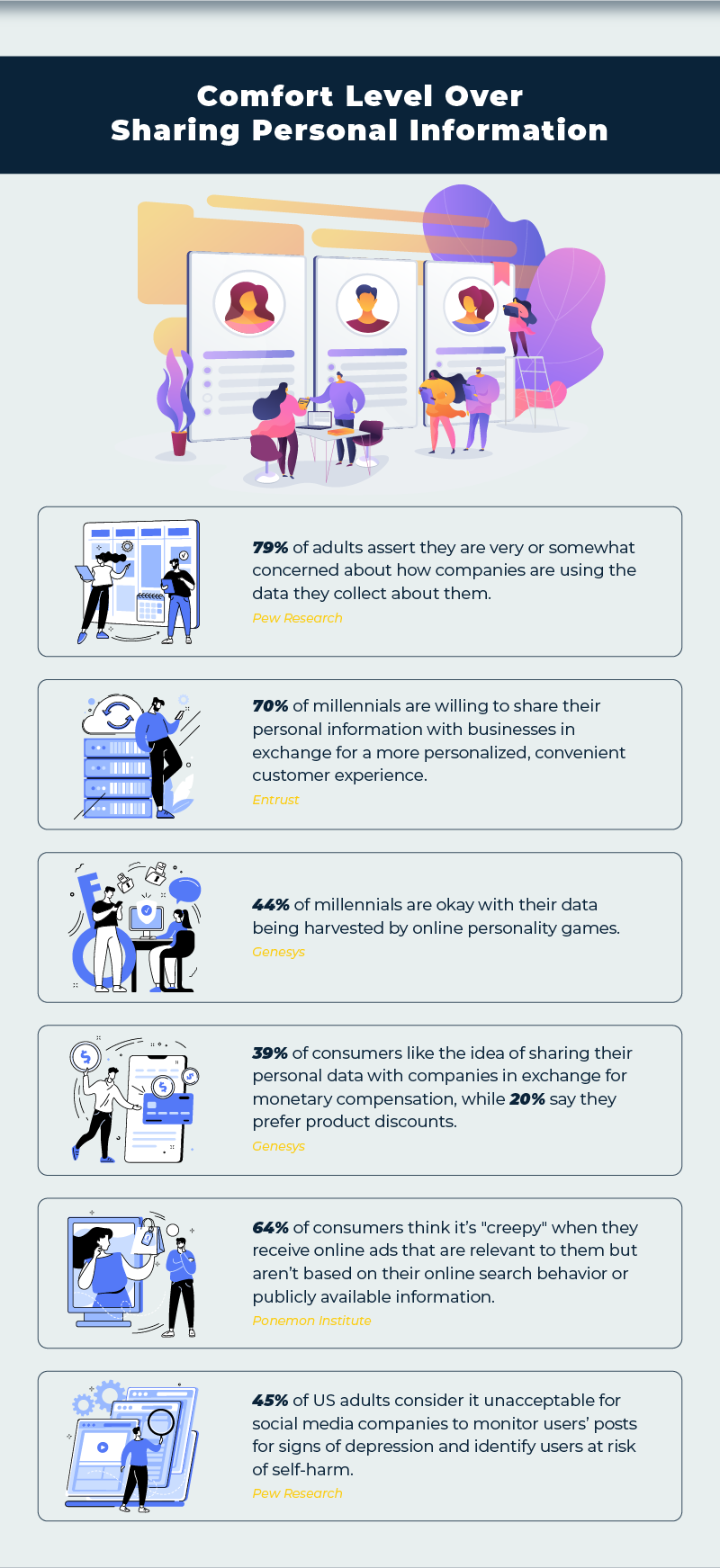
Data misuse is a common fear among internet users worldwide. In the US, 79% of adults are somewhat or very concerned about how companies use the data they collect from consumers.
Despite their concern, most people understand that it’s impossible not to leave any trace of personal information online. They know that they’ll also benefit from the insights companies and governments draw from the data they collect on online users.
Personalized Marketing
As mentioned above, one of the most common purposes of online data mining for businesses is to deliver a personalized customer experience. Personalization tailors goods and services to a customer’s specific needs, expectations, and preferences, resulting in a more positive and seamless brand experience that convinces the buyer to continue supporting that business.
The Entrust study revealed that younger generations give more importance to personalized marketing than older ones. Seventy percent of millennials are willing to share their personal information if it means getting more relevant and convenient services from businesses, while only 48% of baby boomers share the same thinking.
Additionally, 44% of millennials don’t mind playing personality quizzes on social media that harvest their data, according to a Genesys report.
Financial Benefits
Aside from personalized marketing, money is another trade-off that some consumers are willing to consider in exchange for their personal information. The same Genesys report found that people recognize the value of their data to businesses, which is something they want to capitalize on.
According to the survey, 39% would like to receive monetary compensation from businesses in exchange for their personal data, and 20% would prefer product discounts. Forty-six percent of those interested in financial benefits are boomers.
However, the survey pool was polarized when asked to choose between convenience, money, or data privacy. Forty-two percent chose money, saying they’d register for club card benefits even though they know that the establishment will share their data with partners. However, 40% said their privacy takes priority because they don’t trust businesses to keep their personal data safe.
Invasive Data Collection and Data Use
Consumers expect businesses to use only the information they consented to share. Thus, they would feel that their privacy has been violated if a company appears to have used data that they didn’t volunteer.
When it comes to personalization, for instance, the same study by Ponemon Institute found that 64% of consumers think it’s “creepy” when they receive online ads that are relevant to them but aren’t based on their publicly available information or online search behavior.
Online users also want the ability to opt out of targeted ads on any topic anytime to retain some control over their data privacy.
Aside from hyper-personalized marketing, another example of data mining that most people would find invasive is social media monitoring. Pew Research reports that 45% of U.S. adults consider it unacceptable for social media companies to monitor users’ posts for signs of depression and identify users at risk of self-harm.
The same pattern arises regarding smart speaker manufacturers that share audio recordings of customers with law enforcement to help with criminal investigations. The Pew Research study found that 49% find this invasive.
Consumer Proactivity towards Data Protection
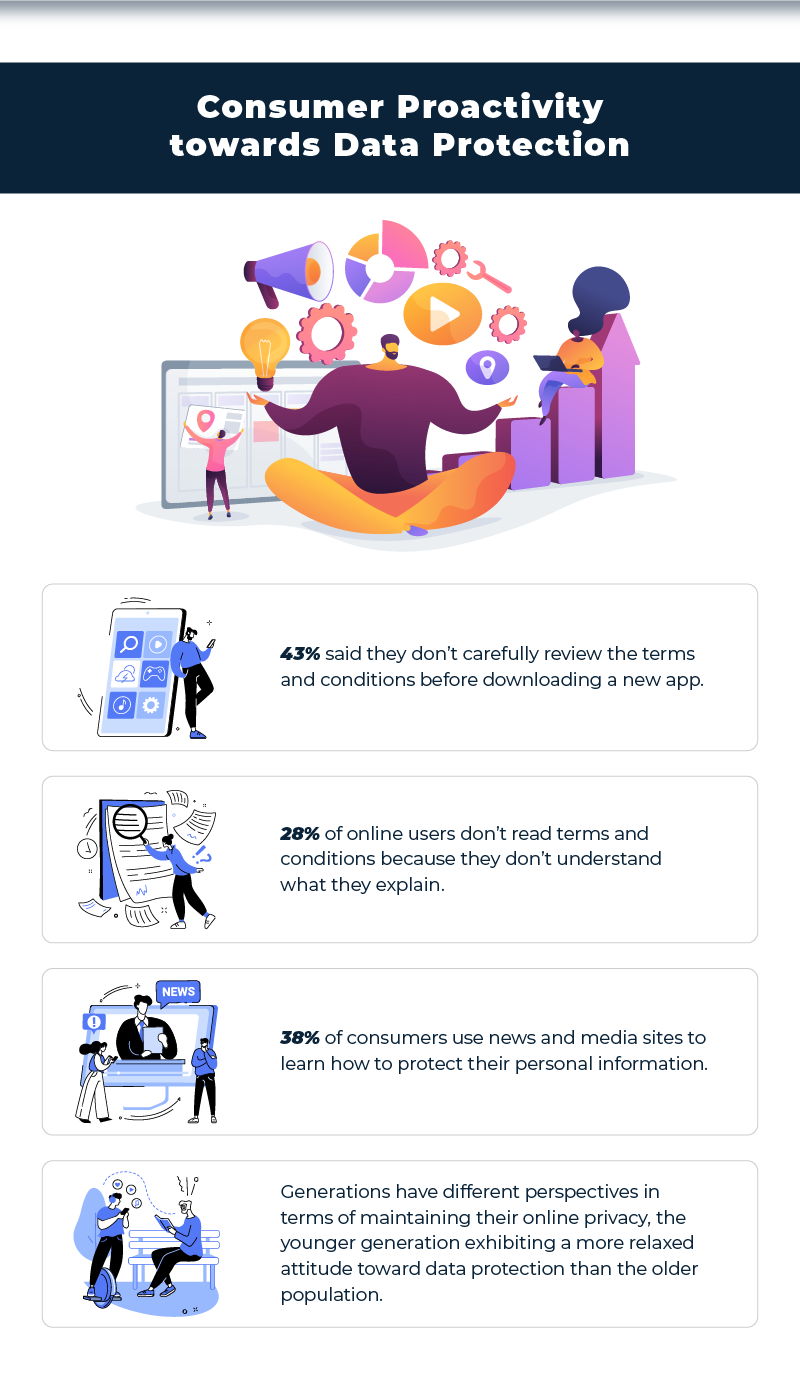
Despite the growing consumer concern over data privacy, the 2021 Entrust research found that not all online users are taking the necessary steps to protect their digital data. In fact, although 82% consider themselves proactive when it comes to upholding their online data privacy, 43% said that they don’t even review the terms and conditions of a mobile app before downloading it.
Among those who blindly agree to terms and conditions, 69% said that they don’t read them because of how long they are and 28% said that they won’t understand what they explain anyway.
The report also revealed that generations have different perspectives when it comes to protecting their data privacy:
- 41% of baby boomers don’t know where to start in terms of data privacy
- 42% of Gen X consumers accept privacy terms and conditions as part of using apps
- 37% of millennials don’t believe they have much control over their data
- 54% of Gen Z consumers said it takes too much time to manage their online data across every service and app
Another key finding regarding consumer proactivity toward data protection is that online users rely primarily on traditional news and media outlets for education. The study saw that 38% of consumers look to news and media sites for information on personal data protection.
How to Protect Your Online Privacy
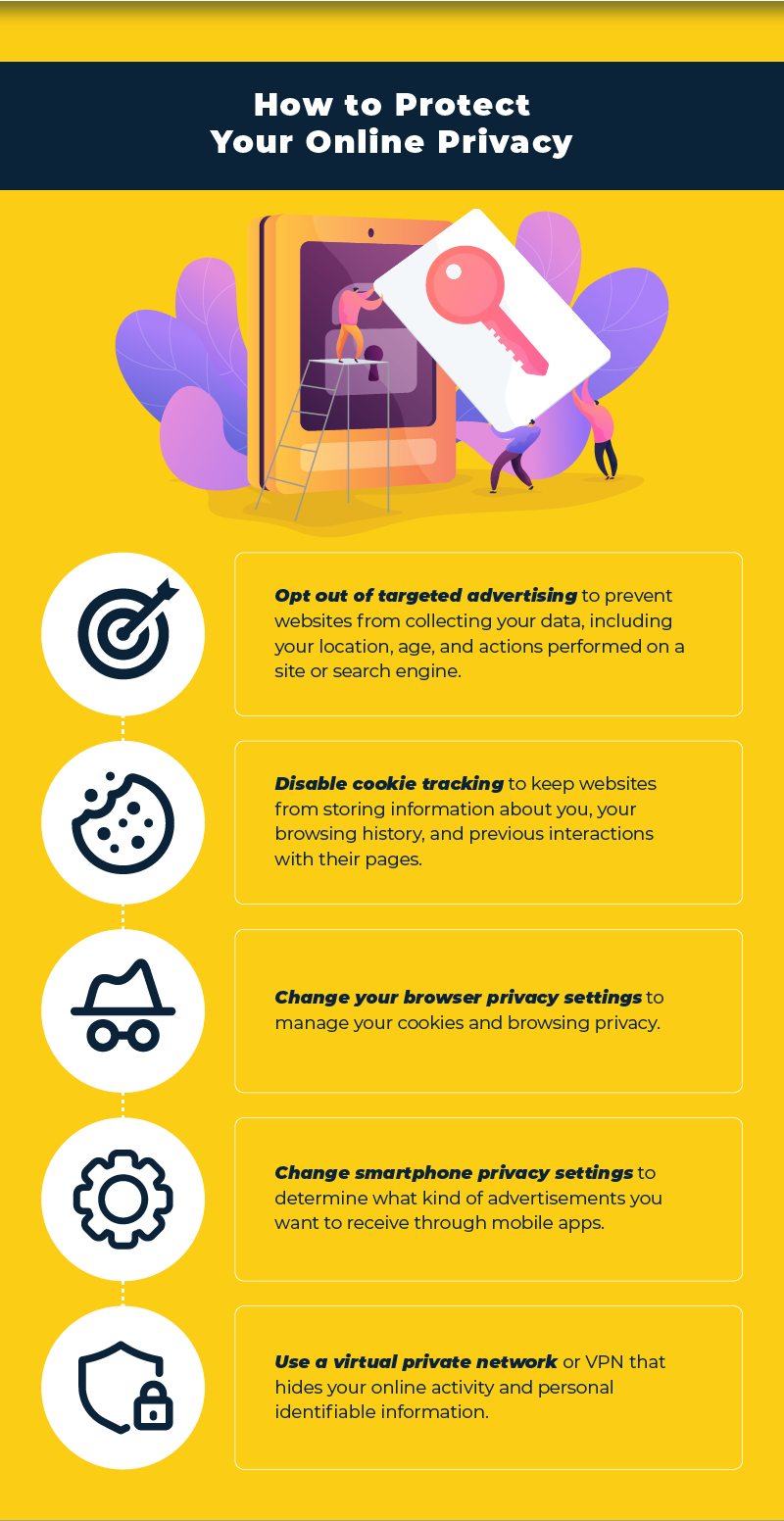
Looking at the figures on how consumers feel about their online privacy as well as people’s current practices in terms of protecting their digital data, it can be concluded that there’s still an imperative need for education on data protection.
Equipping consumers with the right information will empower them to secure their personal privacy and regain control of the kind of data they want to share online and for what purpose.
Below are some internet safety practices that consumers can follow to protect their online privacy:
- Opt out of targeted advertising to prevent websites from collecting your data, including your location, age, and actions performed on a site or search engine. The Network Advertising Initiative and Digital Advertising Alliance both offer free tools that let you opt out of interest-based advertising.
- Disable cookie tracking to keep websites from remembering your browsing history and previous interactions with their pages. Cookies save information on your all your sessions, including login information, shopping carts, and pages previously visited. If you want to opt out of cookie tracking entirely, turn on the “Do Not Track” setting on your browser, although this may also disable certain site features.
- Change your browser privacy settings to manage your cookies and browsing privacy. If you want to reinforce your online data security even more, you can change your browser privacy settings to have more control over your personal information. These settings allow you to review the cookies you have on your computer, decide what type of cookies you want to allow and from which websites, and turn on private browsing mode.
- Change smartphone privacy settings to determine what kind of advertisements you want to receive through mobile apps. Most mobile devices have privacy settings that let you decide whether you want your targeted ads to be based on your browsing activity or your app usage. You can also turn off personalized ads through your phone’s privacy settings.
- Use a virtual private network (VPN) that hides your online activity and personal identifiable information. A VPN gives you anonymity by masking your IP address, making your online actions virtually untraceable.
How to Erase Yourself from the Internet
If you’re adamant about withholding as much personal data from corporations as possible, you can take it one step further by minimizing your digital footprint. You can’t fully remove yourself from the internet, but there are ways to limit your information online. Here are some of them:
1. Delete or deactivate online accounts
These include your social media, shopping, web service, and email accounts. Aside from your current ones, such as Facebook and Twitter, you also want to check for your old profiles on Tumblr, MySpace, and the like.
For shopping accounts, try to think of all the e-commerce sites you’ve signed up for. Some of the most popular are Amazon, Zalora, Shopee, and Lazada.
To remove yourself from these websites, you have to visit each, go to the account settings, then look for an option to delete or deactivate your account. If you can’t find it, Google “how to delete,” followed by the name of the account you want to deactivate. You should be able to find step-by-step instructions on how to do it.
2. Update your Google search results
You can request for Google to take down outdated web pages containing your information. Let’s say, for example, you’d like to get rid of your employee profile on your old employer’s website. Your employer already removed you from their website, but for some reason, the page still appears on search results when you look up your name online.
That’s probably because Google still has the old version of the page cached on its servers. What you can do is submit the URL to Google’s Outdated Content tool for removal.
3. Opt out of data brokers
Data brokers or data collection sites gather information on you, including your name, date of birth, home address, and even where you went to school.
Admittedly, removing yourself from these websites is a long, tedious endeavor. To speed up the process, you can use a paid third-party service like DeleteMe. It’s a subscription service that takes care of the removal process of you and works to keep your name from being re-added to data collection sites.
If you’re not keen on paying for a service, you can start with these opt-out forms that DataBrokersWatch.org created to help you remove your data from the 10 biggest data broker sites.
4. Remove your info directly from websites
The last step is an even more complicated process. You need to comb through all the websites and forums where you’ve posted a blog, asked a question, or created an account, then ask the webmaster to erase your data.
You can either check the Contact or About section of each website to know how you can reach out to the webmaster.
Take note that if you’re looking to remove personal information online that’s harmful, such as explicit photos or defamatory statements, it’s best to seek legal support so you’d know the best course of action to take.
Take Control of Your Digital Data
Today, digital can no longer be separated from consumer habits and practices. As such, the need to enable buyers to execute their shopping needs online without risking their safety and privacy becomes a priority for everyone involved – this includes law-making bodies, the consumers themselves, and the companies mining data.
First, many countries are still in need of updated, specific national consumer privacy laws. The US, for instance, still doesn’t have such a law despite ongoing efforts to enact one. These legislations are imperative because they’ll set the framework for how companies are allowed to collect information on users.
As an online user, educating yourself is the first step to taking back control of your digital data. It’s your best defense against identity theft and other online security threats.
Lastly, because the number one purpose of collecting consumer data is to transform businesses, the responsibility of legal and non-invasive data collection falls on companies first and foremost. This means that as a business owner, it’s your duty to make sure that your consumers have consented to your methods for gathering information on them.
Find out what data privacy means for marketers to learn the full scope of this issue’s implication on your business and marketing efforts.


